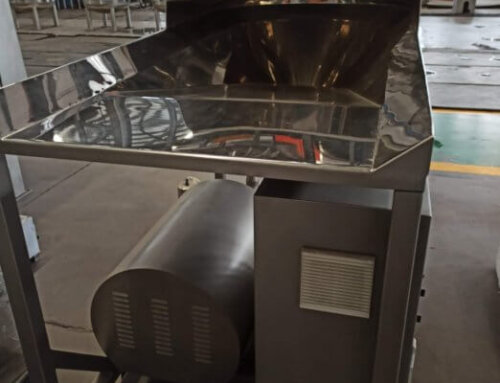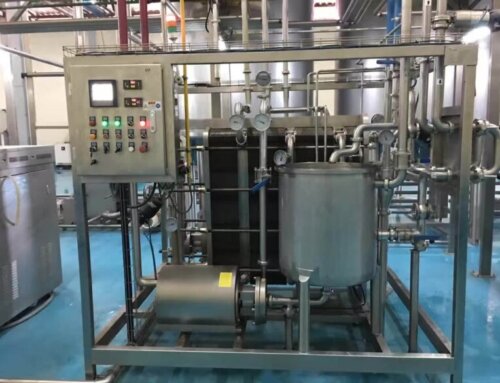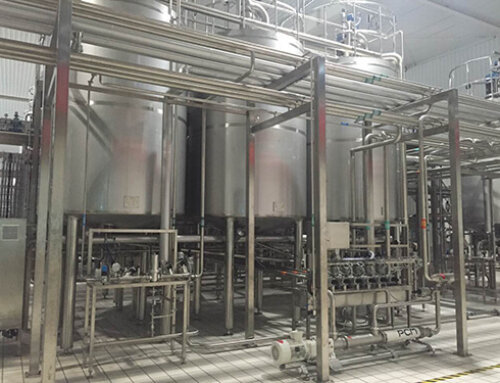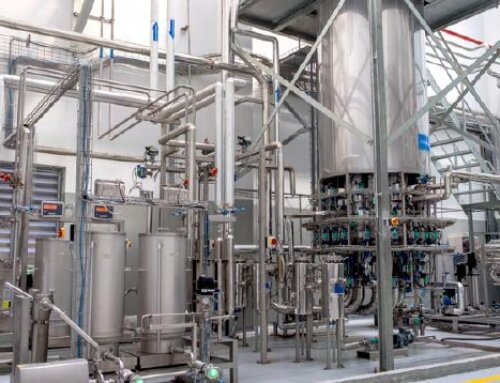Nutrients & Benefits of Guava Fruits
Guava is rich in nutrients, including protein, vitamins, dietary fiber, minerals, lipids and so on.
-Vitamin C: Every 100 grams of guava pulp contains about 10 mg of vitamin C, which is one of the essential antioxidant substances for the human body and helps protect the body from free radical damage.
– Dietary fiber: Every 100 grams of guava pulp contains about 3 grams of dietary fiber, which helps to promote the health of the digestive tract, lower cholesterol levels, and prevent constipation and other problems.
-Potassium: Guava is also a potassium-rich fruit, with about 250 mg of potassium per 100 grams of pulp, which helps maintain normal heartbeat and blood pressure levels.
– Antioxidants: Guava is rich in polyphenolic compounds, such as anthocyanins, flavonoids, etc. These compounds have powerful antioxidant effects and help prevent cancer, cardiovascular diseases and other diseases.

Guava Processing Plant Description
Guava fruit is one type of tropical fruit that’s widely cultivated and produced in India, Mexico, Brazil, Thailand, Pakistan, Indoensia, Colombia, the Philippines and other tropical countries. It is round or pear-shaped with green or yellow skin, and the fruit flesh is white, red or pink according to the variety.
Guava fruits are mainly composed of fruit pulp(edible parts), seeds, and fruit skin/peel. The fruit pulp/flesh is about 50%-60% weight of fruits; The guava fruit seeds are distributed in fruit pulp, and account for 15%-20% of the whole fruits; The guava peel is about 10%-30% of the whole fruits and the thickness is about 1-3mm.
The guava fruits can be processed into concentrated or single-strength pulp/ juice, jam, canned guava fruits, guava powder, carbonated guava beverage, guava nectar, etc. The end products can be filled into bag in drum containers, bottles, metal cans, and cartons according to the clients’ different requirements.
The guava processing plant capacity is from 1 ton per hour to 30 tons per hour with fresh fruits input capacity for clients to choose from.
All of the guava processing machines are made of SUS304 material, which can meet the requirements of food processing safety and hygiene conditions.
The Guava production process involves fresh guava fruit washing and sorting, removing black stems on top and bottom, milling and pulping, guava pulp or juice filtration, guava juice/nectar formulation and blending, concentrating, spray drying(for guava powder production), sterilizing, homogenizing, deaerating, and filling.
Guava Processing Plant End Products And Package
Single-strength guava puree: The guava puree is about 8-11 Brix, with pH value of about 4.2, and it is one of the main products in the guava processing plant. The fruit is usually macerated into puree first and then further processed to nectars, nectar blends, clarified juice, concentrates, powder, juice bar, jelly, and more. The end products can be filled into aseptic bags or soft bags and then frozen storage into the warehouse with a shelf life of 12-24 months.
Guava concentrates: The concentrated products mainly include guava concentrated puree and guava concentrated clear juice. The concentrated puree will be concentrated to 34 Brix by the forced circulation evaporator; whereas the concentrated juice will be evaporated to 66 Brix by the falling film evaporator. The end products after concentrated and pasteurized, can be filled into bag in drums or IBC containers for easy transport.
Guava juice: Guava juice is a transparent and slightly colored pink, yellow, or white drink, which can be used for producing guava nectar, guava powder or jelly products. The guava juice can be filled into bottles, pouches, and cans for direct consumption.
Guava nectar: Single-strength or concentrated guava puree/juice can be blended with water, sucrose, citric acid, and other flavor additives to formulate guava nectar products. Guava nectar can be filled into cartons, PET, or glass bottles for retail selling.
Carbonated guava beverage: The guava juice can be mixed with syrup, CO2 and then filled into small cans or bottles.
Guava powder: Guava juice after concentrating and spray drying, then make into the powder products. The end products can be filled into pouches and cans.
Canned guava products: Canned guava products are usually packed in syrup in the form of wholes, halves, shells, or slices.

Guava Processing Plant Technological Flowchart
Concentrated or single-strength guava puree production process: The freshly harvested guava fruits will be ripened at room temperature for 2-7 days in ripen chamber, then the ripened guava fruits will be dumped on the belt sorting conveyor, the spoiled or low-quality fruits will be disregarded and sorted out, the high-quality fruits will be fed into the washing system for high-pressure air washing and brush washing. Then the clean guava fruits will be sent to the peeler and rotor crusher to obtain the guava mash, then the guava mash is pumped into the pulper or finisher, where the guava seeds, coarse fiber and peels will be separated from the pulp. To get the more pure and smooth guava pulp, the disk centrifuge separator will be applied to the pulp to separate the solids in the pulp. Then the guava pulp can be pumped into an evaporator to make the concentrated pulp or fed into the sterilizer/pasteurizer directly to make the single-strength guava puree products.
Concentrated or single-strength guava juice production process: Fresh guava fruits after washing, sorting, crushing, and pulping, then the guava pulp is obtained, the guava pulp will be fed into the enzyme treatment tanks for enzymolysis, then pumped into the decanter centrifuge to obtain the juice from the pulp. After that, the guava juice can be filtrated by a disk separator and membrane filtration to get clear juice. The clear juice then can be concentrated or sterilized directly to make it into concentrated juice or NFC juice.
Guava nectar production process: Using the guava juice or pulp as raw material, then blend it with water, sugar, and acid to make the guava nectar, then the guava nectar will be pasteurized/sterilized, homogenized, degassed and filled into small containers for consumption.
Canned guava production process: The ripened guava fruits will be washed and lye peeled by immersing in 2.5% boiling sodium hydroxide solution for 15 sec, rinsing with water, and then dipping in 0.5% citric acid solution to neutralize the residual alkalinity. Then the fruits will be cut into halves or dice and filled into cans, then 40% sugar syrup will be hot filled into cans at the later stage, then the cans will be sealed and boiled in hot water for sterilizing.

Guava Processing Plant Key Machine Introduction
Guava washing and sorting machine
The guava washing system is made up of a bubble water washing and soaking machine, a brush washing machine, and a high-pressure pure water rinsing section. In the bubbling water-soaking section, mechanical agitation and the addition of detergent help to loosen dirt, debris, and other contaminants from the surface of the fruit. In the brushing washing machine, the residual contaminants on the surface of the fruit are detached by the action of a mechanical brush. Clean water is sprayed onto the fruit in the rinsing section to remove the detergent.
Cleaned guavas leave the washing system on a belt for the final inspection before crushing and pulping. And when for sorting and inspection, the black stems on top and bottom can be spooned out by the operator manually.


Guava crushing and pulping machine
The clean guava fruits will be elevated to the tooth crusher for milling to 3-5mm fruit mash, then the guava mash will be pumped to the pulper and finisher. The pulper and the finisher are equipped with 0.6–1 mm and 0.3mm screens, respectively. The screen on the pulper separates the seeds and the fibrous fragments of skin tissue to get the smooth pure guava pulp. The pulp yield rate is about 60% through our crushing and pulping machines.
Guava pulp separating machine
After pulping, a small amount of broken seeds may remain in the guava pulp. To remove these residual solids, the pulp can first be passed through a sieve screen to eliminate larger particles. The filtered pulp can then be further clarified using a disc centrifuge separator, which efficiently separates fine seed fragments and other suspended solids from the liquid phase.
The stack centrifuge separator is typically carried out to adjust the ratio of insoluble solids to liquid in the final guava puree. This process effectively removes residual stone cells, enhancing the mouthfeel and reducing the product’s tendency to precipitate. For instance, a common process involves utilizing a 12-inch solid bowl centrifuge separator with a spinning speed of 5000rpm.

Guava pulp pasteurizer and filler
The guava pulp can be pasteurized in a tube-in-tube pasteurizer at 93–96℃ for 36 seconds or at 88–90℃for 60S. Then the guava pulp will be cooled to 4℃ and then filled into flexible bags, and then frozen and stored at -18℃ (0F) as a semi-product for later use with a shelf life in a storage period of up to 1 year.
The guava pulp can also be sterilized at 115-121℃ for 15- 30 seconds, and then cooled to 25-30℃ for aseptic filling into the aseptic bags. The end products can be stored at room temperature with a shelf life of more than 6 months.






